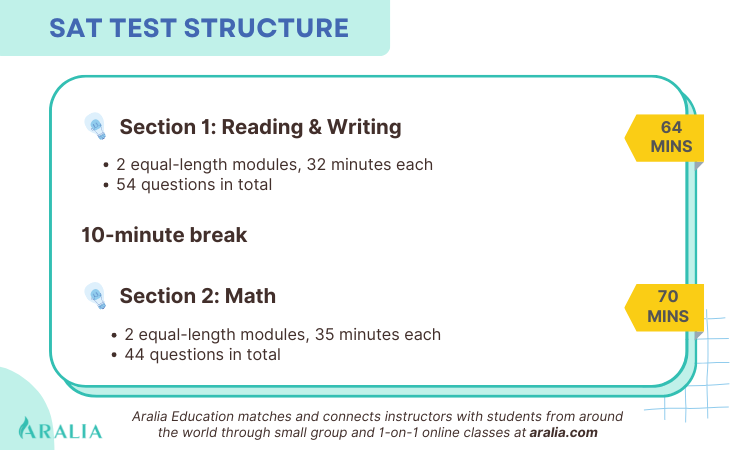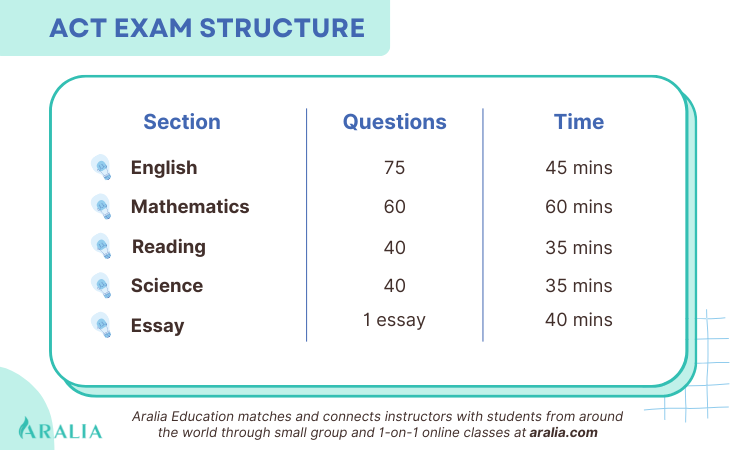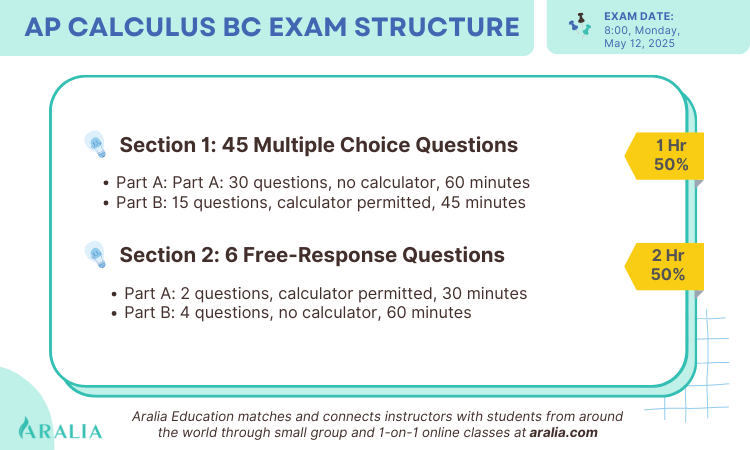Improve Your AP Grades Within One Semester
1. SAT
The SAT is a standardized college admissions exam administered by the College Board in the United States. The international SAT is offered on scheduled dates in March, May, June, October, November, and December.
Format: Since 2023, the SAT has transitioned to a digital format.
Test Structure: The current SAT consists of two main sections—one covers reading and writing, and the other focuses on math, instead of the previous three-part format. Each section is scored on a scale of 200 to 800, making the highest possible total score 1600. The testing time has also been reduced from 3 hours to 2 hours and 14 minutes. All questions are multiple-choice. The breakdown of the test structure is as follows:

SAT Content Overview:
The Math section covers the following topics:
- Algebra: Linear equations, inequalities, and systems of equations.
- Advanced Math: Quadratic equations, polynomials, absolute value equations, and more.
- Problem-Solving and Data Analysis: Ratios, rates, proportions, data interpretation, and statistics.
- Geometry and Trigonometry: Area, perimeter, volume, angles, triangles, and circles.
The Reading and Writing section tests students on:
- Information and Ideas
- Craft and Structure
- Expression of Ideas
- Standard English Conventions
Test Fee: $68 registration fee.
Test Dates: You can check the SAT schedule for the 2025–2026 academic year here.
Score Report: SAT results are typically available 2 to 3 weeks after the test date.
Additionally, for students interested in law school, the LSAT (Law School Admission Test) is a separate standardized exam explicitly designed for legal studies.
2. ACT
The ACT, short for American College Testing, is another standardized exam used for U.S. college admissions. It assesses the academic readiness of high school students and is held annually in February, April, June, July, September, October, and December. Starting in 2025, the ACT will feature a new test structure with fewer questions.
Format: The ACT is offered in both online and paper-based formats. The updated test structure will be introduced for the online version beginning in April 2025 and for the paper version in September 2025.
Test Structure: The ACT consists of four main sections: Math, English, Reading, and Science. There is also an optional writing section. Each section is scored on a scale of 1 to 36, and the overall ACT score is the average of the four section scores. The total testing time is 2 hours and 55 minutes, with an additional 40 minutes for the optional essay. The detailed test structure is as follows:

Test Fee: $65 for the standard test, an additional $25 if you take the optional writing section, and $4 for the optional science add-on.
Test Dates: You can check the ACT test schedule for the 2025–2026 academic year here.
Score Report: ACT results are typically released about two weeks after the test date.
Which Test is More Difficult: the SAT or ACT?
The difficulty of the SAT and ACT depends largely on each student’s strengths and preferences. For example, students who are strong in math may find the SAT easier, as math makes up about 50% of the test. On the other hand, students who are less confident in the subject might prefer the ACT, where math only accounts for about 25% of the total questions.
Should You Take the SAT or ACT?
U.S. colleges and universities accept both SAT and ACT scores, so students can choose the test that best suits their abilities. Select the exam that aligns with your strengths to maximize your score. You can also base your decision on your intended major. For instance, if you plan to pursue a math-related field, the SAT might better highlight your quantitative skills. If you’re aiming for a major that emphasizes writing, like communications, the ACT—with its optional writing section—may be the better choice.
Enroll in Aralia’s AP Preparation Courses
3. Other Academic Assessment Tests
In addition to comprehensive standardized tests like the SAT and ACT, international diploma programs such as AP (Advanced Placement) and IB (International Baccalaureate) are also widely recognized in U.S. college applications. Aralia has published a detailed article comparing the AP and IB programs that you can check out for more information.
AP and IB scores are often used to demonstrate a student’s academic strength in specific subjects, as both programs mirror college-level coursework and are more rigorous than standard high school curricula. Moreover, qualifying AP or IB scores can often be converted into college credits for corresponding subjects, a benefit recognized by many universities worldwide.
Below are some key facts about these two standardized programs:
AP (Advanced Placement)
AP, short for Advanced Placement, is a program created by the College Board that offers college-level courses and exams to high school students in the United States. Students who take AP classes typically have completed foundational high school coursework and want to begin exploring college-level material early.
The AP exams are administered every year in May, and students only take the exams for the subjects they have studied and registered for.
- Format: In-person exams. Students must go to an official test center to take the exam.
- Structure: Each AP exam has a different structure depending on the subject, but most exams include both multiple-choice questions and free-response (essay or problem-solving) sections. AP exams are scored on a scale of 1 to 5, with a score of 3 or higher considered passing.
Here’s an example of the structure for the AP Calculus BC exam:
- Section I – Multiple Choice (45 questions)
- Part A: 30 questions, no calculator, 60 minutes
- Part B: 15 questions, calculator permitted, 45 minutes
- Section II – Free Response (6 questions)
- Part A: 2 questions, calculator permitted, 30 minutes
- Part B: 4 questions, no calculator, 60 minutes
The content of the AP Calculus BC exam covers all AP Calculus AB topics plus additional concepts like sequences and series.

Exam Fee: Starting from $99 per subject, except for AP Capstone subjects ($147)
IB (International Baccalaureate)
IB, short for International Baccalaureate, is a global educational program administered by the International Baccalaureate Organization in Switzerland. The subjects in the IB program offer more in-depth and advanced content than regular high school curricula and emphasize soft skills development. The IB program typically holds two exam sessions per year: one in May and one in November.
- Format: In-person exams. Students must go to an official test center to take the exam.
- Structure: The structure of IB exams varies depending on the subject. IB subjects and exams are divided into Standard Level (SL) and Higher Level (HL). IB exams are scored on a scale from 1 to 7. Generally, a score of 4 or higher at the Higher Level is eligible for university credit.
Exam Fee:
- Candidate Subject Fee: $123 per subject.
- Extended Essay: $94.
- Theory of Knowledge (TOK): $48.
- Creativity, Activity, Service (CAS): $10
The Importance of Standardized Test Scores in U.S. College Admissions
Standardized tests like SAT and ACT evaluate a student’s readiness for college-level coursework. The scores from these tests serve as an additional factor in the college admissions process, supplementing academic records or high school transcripts. They help admissions committees assess a student’s academic abilities and potential to succeed in the rigorous environment of U.S. higher education.
U.S. University Requirements for Standardized Test Scores in College Applications: The requirement for submitting SAT or ACT scores varies by university. Prestigious U.S. universities, such as Harvard and MIT, require students to submit SAT or ACT scores. If a student cannot take the test due to extenuating circumstances, they should write an explanation letter and may submit AP or IB scores as substitutes. Additionally, most U.S. universities now do not require students to submit SAT or ACT scores, instead offering more flexibility in the admissions process.
Supplementary standardized tests like AP and IB are generally not mandatory. Contingent on the university’s policy, AP and IB scores may be used to replace SAT/ACT scores if a student faces difficulties and cannot take the SAT/ACT (in this case, students must explain the situation clearly to the university). AP and IB scores are typically used to demonstrate a student’s exceptional abilities in specific subjects during high school. Additionally, strong AP and IB scores may allow students to earn college credits for the corresponding subjects, potentially reducing tuition costs for these courses.
Depending on your personal profile and the requirements of each university, you may need to prepare different standardized certificates. Regardless of which standardized test you plan to take, it’s essential that you make a solid plan and allow enough time to study effectively. Best of luck!

AP and IB Exam Preparation
AP and IB Exam Preparation Excel in Advanced Assessments Maximize study efficiency and accelerate score improvement with practice examinations, expert

Competition Preparation
Competition Preparation Strengthen your profile through competitions Gain the skills, strategies, and confidence to succeed in competitions. Inquire today Diamond










